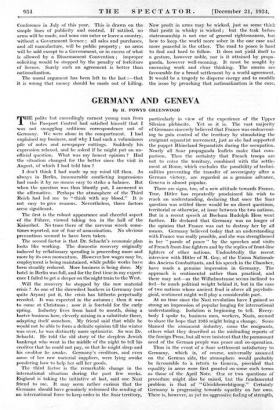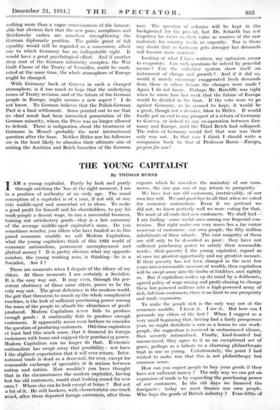GERMANY AND GENEVA
By H. POWYS GREENWOOD
THE polite but exceedingly earnest young man from the Passport Control had satisfied himself that I was not smuggling seditious correspondence out of Germany. We were alone in the compartment. I had explained my business, and why I had such a voluminous pile of notes and newspaper cuttings. Suddenly his expression relaxed, and he asked if he might put an un- official question. What was my honest opinion ? Had the situation changed for the better since the visit in August, of which I had told him ?
I don't think I had made up my mind till then. As always in Berlin, innumerable conflicting impressions had made it by no means easy to strike a balance. But when the question was thus bluntly put, I answered in the affirmative. Perhaps the atmosphere of the Third Reich had led me to " think with my blood." It is not easy to give reasons. Nevertheless, three factors seem significant.
The first is the robust appearance and cheerful aspect of the Fiihrer, viewed taking tea in the hall of the Kaiserhof. No trace there of the nervous wreck some- times,-reported, nor of fear of assassination. No obvious precautions seemed to have been taken.
The second factor is that Dr. Schacht's economic plan looks like working. The domestic recovery originally induced by reflationary spending is proceeding more and more by its own momentum. However loW wages may be, employment is being maintained, while public works have been steadily reduced. More business is being done. My hotel in Berlin was full, and for the first time in my experi- ence I failed to get a Sleeper on the night train to the West.
,Will the recovery be stopped by the raw material- crisis ? As one of the shrewdest bankers in Germany (not. quite Aryan) put it, the crisis has hitherto perpetually receded. It was expected in the autumn ; then it was to come at Christmas ; now it is foretold for the early spring. Industry lives from hand to mouth, doing a barter business here, cleverly mixing in a substitute there, adapting itself somehow. My friend said that while he would not be able to form a definite opinion till the winter was over, he was distinctly more optimistic. So was Dr. Schacht. He told the old story of the sleepless Jewish bankrupt who went in the middle of the night to tell his creditor that he could not pay, so that he might sleep and his creditor lie awake. Germany's Creditors, and even sonic of her raw material suppliers, were lying awake pondering how to help her sell her goods.
The third factor is the remarkable change in the international situation during the past few weeks. England is taking the initiative at last, said one Naii friend to me. It may seem rather curious that the Germans should have genuinely welcomed the sending of an international force to keep order in the Saar territory, particularly in view of the experience of the Upper Silesian plebiscite. Yet so it is. The vast majority of Germans sincerely believed that France was endeavour- ing to gain control of the territory by stimulating the emigrant separatist movement, just as she had supported the puppet Rhineland Separatists during the occupation. Nearly all Saar propaganda leaflets make that com- parison. Thus the certainty that French troops are not to enter the territory, combined with the settle- ment at Rome, which excludes the possibility of techni- calities preventing the transfer of sovereignty after a German victory, are regarded as a genuine advance. Geneva is almost popular.
There are signs, too, of anew attitude towards Fiance. True, Hitler has repeatedly proclaimed his wish to reach an understanding, declaring that once the Saar question was settled there would be no direct queStions, territorial or otherwise, at issue between the two nations. But in a recent speech at Bochum Rudolph Hess went further. He declared that Germany was no longer of the opinion that France was out to destroy her by all means. Germany believed today that an understanding with France was really possible, and she was strengthened in her " parole of peace " by the speeches and visits of French front-line fighters and by the replies of front-line fighters of other nations. Undoubtedly the recent interview with Hitler of M. Goy, of the Union Nationale des Anciens Combattants, and his speech in the Chamber, have made a genuine impression in Germany. The approach is sentimental rather than practical, and there may not—as the Wilhehnstrasse seems inclined to feel—be much political weight behind it, but in the case of two nations whose ancient feud is above all psycholo- gical, sentiment might well play a considerable part.
At no time since the Nazi revolution have I gained so strong an impression of popular longing for international understanding. Isolation is beginning to tell. Every- body I spoke to, business men, workers, Nazis, seemed to share the hope that 1935 might bring a change. Some blamed the armament industry, some the emigrants, others what they described as the misleading reports of the foreign Pre,ss,.but all were insistent that the paramount need of the German people was peace and co-operation.'
Thus in the event of a Saar settlenient satisfactory to Germany, which is, of course, universally assumed on the German side, the atmosphere would probably be favourable to 'a return to Geneva, provided that equality in arms were first granted on some such terms as those of the 'April Note. One or two questions of procedure might also be raised, but the fundamental problem is that of " Gleichberechtigung." Certainly Germany is progressing towards equality on her own. There is, however,' as yet no aggressive feeling of strength, nothing more than a vague consciousness of the lament- able but obvious fact that the new guns, aeroplanes and Reichswehr cadres are somehow strengthening the German 'diplomatic position. The public grant of full equality would still be regarded as a concession, albeit one to which Germany has an indisputable right. It would have a great psychological effect. And if another deep root of the German inferiority complex, the War Guilt Clause of the Treaty of Versailles, could be eradi- cated at the same time, the whole atmosphere of Europe might be changed.
With Germany back at Geneva in such a changed atmosphere, is it too much to hope that the underlying issues of Treaty revision, and of the future of the German people in Europe, might assume a new aspect ? I do not know. No German believes that the Polish-German Pact is a final settlement. Some pointed out to me that its chief result had been intensified persecution of the German minority, whom the Press was no longer allowed to defend. There is indignation about the treatment of Germans in Memel—probably the next international question after the Saar. Neither Hitler nor his followers are in the least likely to abandon their ultimate aim of uniting the Austrian and Reich branches of the German race. The question of colonies will be kept in the background for the pres Nit, but Dr. Schacht has not forgotten his views on their value as sources of the raw materials his country needs so urgently. Nor is there any doubt that as Germany gets stronger her demands will become more insistent.
Looking at what I have written, my optimism seems to evaporate. Can such questions he solved by peaceful means ? Can the collective system show itself an instrument of change and growth ? And if it did so, would it merely encourage exaggerated fresh demands from those in whose favour the changes were made ? Again I do not know. Perhaps Mr. Ratcliffe was right when he wrote here last week that the future of Europe would be decided in the Saar. If the vote were to go against Germany, as he seemed to hope, it would be a great, though not a decisive, blow to Hitler. It would finally put an end to any prospect of a return of Germany to Geneva, or indeed to any co-operation between Ger- many and Europe, until the Third Reich had collapsed. The rulers of Germany would feel that war was their only way out. In that case I think I should write a companion book to that of Professor Banse —Europe, prepare for Tear!



































 Previous page
Previous page